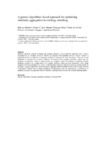Mostrar o rexistro simple do ítem
A genetic algorithms-based approach for optimizing similarity aggregation in ontology matching
| dc.contributor.author | Martínez-Romero, Marcos | |
| dc.contributor.author | Vázquez-Naya, José | |
| dc.contributor.author | Nóvoa, Francisco | |
| dc.contributor.author | Vázquez, Guillermo | |
| dc.contributor.author | Pereira-Loureiro, Javier | |
| dc.date.accessioned | 2018-06-01T08:01:33Z | |
| dc.date.available | 2018-06-01T08:01:33Z | |
| dc.date.issued | 2013 | |
| dc.identifier.citation | Martínez-Romero M, Vázquez-Naya JM, Nóvoa FJ, Vázquez G, Pereira J. A genetic algorithms-based approach for optimizing similarity aggregation in ontology matching. Ponencia presentada en International Work-Conference on Artificial Neural Networks. IWANN 2013; 2013 Jun 12-14; Puerto de la Cruz, Tenerife. Berlin: Springer; 2013. p.435-444 (Lecture Notes in Computer Science; 7902) | es_ES |
| dc.identifier.isbn | 978-3-642-38678-7 | |
| dc.identifier.isbn | 978-3-642-38679-4 | |
| dc.identifier.uri | http://hdl.handle.net/2183/20776 | |
| dc.description.abstract | [Abstract] Ontology matching consists of finding the semantic relations between different ontologies and is widely recognized as an essential process to achieve an adequate interoperability between people, systems or organizations that use different, overlapping ontologies to represent the same knowledge. There are several techniques to measure the semantic similarity of elements from separate ontologies, which must be adequately combined in order to obtain precise and complete results. Nevertheless, combining multiple similarity measures into a single metric is a complex problem, which has been traditionally solved using weights determined manually by an expert, or through general methods that do not provide optimal results. In this paper, a genetic algorithms based approach to aggregate different similarity metrics into a single function is presented. Starting from an initial population of individuals, each one representing a combination of similarity measures, our approach allows to find the combination that provides the optimal matching quality. | es_ES |
| dc.description.sponsorship | Instituto de Salud Carlos III; FISPI10/02180 | es_ES |
| dc.description.sponsorship | Programa Iberoamericano de Ciencia y Tecnología para el Desarrollo; 209RT0366 | es_ES |
| dc.description.sponsorship | Xunta de Galicia; CN2012/217 | es_ES |
| dc.description.sponsorship | Xunta de Galicia; CN2011/034 | es_ES |
| dc.description.sponsorship | Xunta de Galicia; CN2012/211 | es_ES |
| dc.language.iso | eng | es_ES |
| dc.publisher | Springer | es_ES |
| dc.relation.uri | https://doi.org/10.1007/978-3-642-38679-4_43 | es_ES |
| dc.rights | The final publication is avaliable at Springer Link | es_ES |
| dc.subject | Genetic algorithms | es_ES |
| dc.subject | Ontology matching | es_ES |
| dc.subject | Ontologies | es_ES |
| dc.subject | Semantic web | es_ES |
| dc.title | A genetic algorithms-based approach for optimizing similarity aggregation in ontology matching | es_ES |
| dc.type | info:eu-repo/semantics/conferenceObject | es_ES |
| dc.rights.access | info:eu-repo/semantics/openAccess | es_ES |
| UDC.journalTitle | Lecture Notes in Computer Science | es_ES |
| UDC.volume | 7902 | es_ES |
| UDC.startPage | 435 | es_ES |
| UDC.endPage | 444 | es_ES |
| UDC.conferenceTitle | International Work-Conferernce on Artificial Neural Networks | es_ES |






